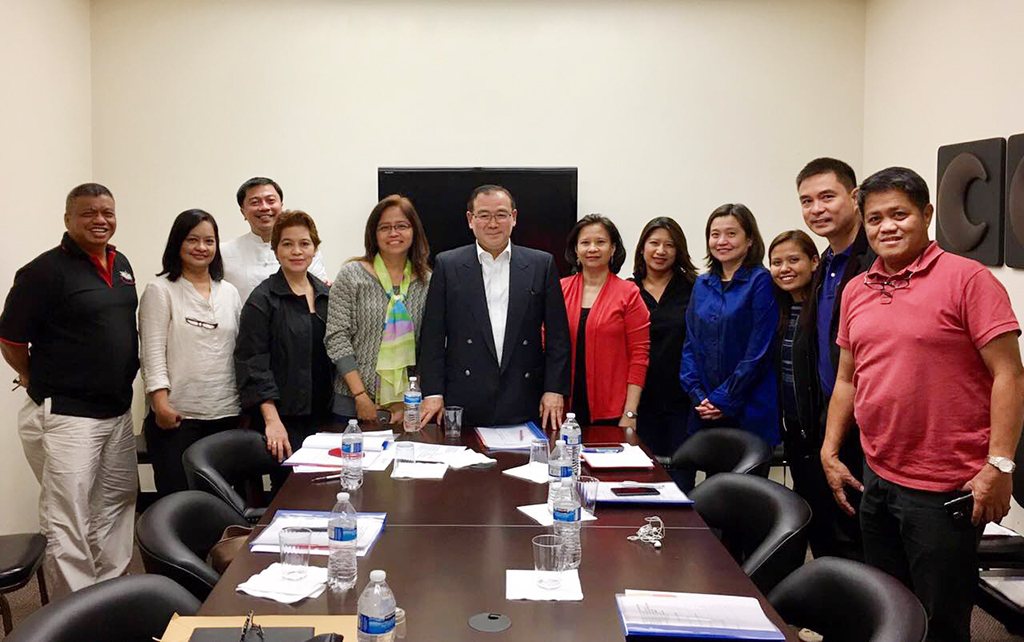
Philippine Mission to the UN, a day before the opening of the conference. (PDCD)
The Philippine Council for Agriculture and Fisheries (PCAF) took part on the high-level United Nations (UN) Conference to Support the Implementation of Sustainable Development Goal (SDG) 14: Conserve and Sustainably Use the Oceans, Seas, and Marine Resources for Sustainable Development on June 5 to 9, 2017 at the UN Headquarters in New York.
Along with Department of Agriculture (DA), National Economic and Development Authority (NEDA), Department of Environment Natural Resources – Biodiversity Management Bureau (DENR-BMB), Bureau of Fisheries and Aquatic Resources (BFAR), PCAF was among the government agencies tapped by the Department of Foreign Affairs (DFA) to attend the 2017 UN Oceans Conference.
For PCAF, Executive Director Sarah Gutierrez-Cayona, Policy Development Coordination Division Acting Chief Julieta Opulencia, and Executive Director of Tambuyog Development, Inc., and PCAF – Committee on Fisheries and Aquaculture representative, Dinna Umengan, attended the conference.
To ensure that the Philippine delegation will be well-informed about the important issues and discussions that will take place during the conference, members of the delegation held a meeting a day before the opening of the event at the office of H.E. Teodoro Locsin, Jr., the Permanent Representative of the Philippines to the UN.
During the meeting, Philippine delegation members were designated to attend the different plenary meetings and side events that will be held simultaneously throughout the conference.
2017 United Nations Oceans Conference
Co-hosted by the Governments of Fiji and Sweden, the high-level conference was called to be the “game changer that will reverse the decline in the health of our ocean, for people, planet and prosperity.”
In September 2015, the world’s leaders representing all 193 Member States of the UN, adopted SDG14 as an integral part of the transformative and universal 2030 Agenda for Sustainable Development.
The event aimed to identify ways and means to support the implementation of SDG14, build on existing successful partnerships, and stimulate innovative and concrete new partnerships to advance the enactment of SDG14.
“Our task at this conference is to ensure that SDG14 receives the support necessary to meet its critical targets. To do that, we need to hear the truth about the state of the Ocean, we need to learn about the difficulties it is facing, and most importantly, we have to assemble the solutions required to overcome those problems. We are here on behalf of humanity to restore sustainability, balance and respect to our relationship with our primal mother, the source of all life, the Ocean,” Peter Thomson, President of the United Nations General Assembly, said on his message.
Outcomes of the Ocean Conference include “Call for Action,” an intergovernmentally agreed declaration to be adopted by consensus; co-chairs’ summaries of seven partnership dialogues; and list of voluntary commitments for the implementation of Goal 14.
Voluntary commitments are initiatives to be voluntarily undertaken by different concerned stakeholders that aim to contribute to the SDG14.
The Philippine government, through BFAR and DENR, registered the country’s voluntary commitment.
The BFAR listed the conduct of National Search for Outstanding Coastal Community Malinis at Masaganang Karagatan (MMK) (Clean and Plentiful Ocean) and National Stock Assessment Program (NSAP) while DENR included the Coastal and Marine Ecosystems Management Plan (CMEMP).
MMK by BFAR aims to recognize outstanding initiatives and contributions of coastal municipals/cities to sustainable fisheries development.
On the other hand, assessment of major pelagic and demersal species in major fishing grounds of the country is done under NSAP.
It is carried out through the establishment of standardized time series and biological data by fishing ground which are fundamental to science-based fisheries management, as well as, on the formulation of fisheries-related policies, plans, and strategies.
As for the CMEMP, it is a national program which aims to comprehensively manage, address and effectively reduce the drivers and threats of degradation of the coastal and marine ecosystems in order to achieve and promote sustainability of ecosystems services, food security and climate change resiliency.
During the partnership dialogues, scientific updates as well as identified solutions and practical recommendations to address identified gaps and challenges were presented and discussed.
The discussion revolved on the following themes: addressing marine pollution; managing, protecting, conserving and restoring marine and coastal ecosystems; minimizing and addressing ocean acidifications; making fisheries sustainable; and increasing economic benefits to Small Island Developing States and Least Developed Countries and providing access for small-scale artisanal fishers to marine resources and markets.
It also discussed the increasing scientific knowledge, and developing research capacity and transfer of marine technology, and enhancing the conservation and sustainable use of oceans and their resources by implementing international law as reflected in the United Nations Convention on the Law of the Sea.
The Philippine Delegation was given an opportunity to raise other elements that they consider to be relevant, particularly, on the discussions on managing, protecting, conserving and restoring marine and coastal ecosystems and making fisheries sustainable.
“The Philippines has put in place several sector-specific action plans, such as the Coral Triangle Initiative National Plan of Action (CTI-NPOA), and the Comprehensive National Fisheries Industry Development Plan (CNFIDP), to protect and conserve coastal and marine resources,” Locsin said in his statement.
He also added that “Other governance modalities have also been initiated to facilitate establishment of conservation areas like the local conservation areas and Indigenous Community Conserved Areas (ICCAs) to ensure full participation of the local and indigenous communities, and other relevant stakeholders.”“The Philippines has put in place several sector-specific action plans, such as the Coral Triangle Initiative National Plan of Action (CTI-NPOA), and the Comprehensive National Fisheries Industry Development Plan (CNFIDP), to protect and conserve coastal and marine resources,” Locsin said in his statement.
SDG was largely seen as a roadmap to improve ocean management and to sustain livelihoods at the local, national, regional, and global scales.
The full outcome of the conferences is on https://oceanconference.un.org/ – LC











